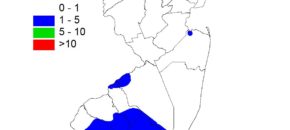The 1 day pre-harvest intervals (PHI) listed for Select 2EC, Select Max, and Poast herbicides in the pepper section of the 2019 Mid Atlantic Commercial Vegetable Production Recommendations is false. The actual PHI as found on the most recent labels of these herbicides are as follows: Select 2EC: 20 days Select Max 0.97EC: 20 days […]
Continue reading...Vegetable IPM Update 7/31/19

Sweet Corn European corn borer (ECB) moth captures have increased slightly in parts of the southern half of the state (see ECB map at left). Thus far, the second flight appears to be very weak, as is consistent with recent years’ second flights. Limited feeding has appeared in whorl and pre-tassel corn. Growers should continue […]
Continue reading...Hackettstown Livestock Auction Results for July 30, 2019
This auction sells: lambs, sheep, goats, calves, beef cattle, pigs, rabbits, and all types of heavy fowl. Auctions are held every Tuesday with the first sale beginning at 10:30 am and ending at the last sale 5:30 pm. Hay, straw, grain, and firewood are also for sale. Farm Fresh Eggs available for purchase by the […]
Continue reading...American Cranberry Growers Association: 2019 Summer Field Day
Date: Thursday August 15, 2019 Location: Rutgers University, P.E. Marucci Center for Blueberry & Cranberry Research & Extension, Chatsworth, NJ AGENDA CRANBERRY BOGS 8:00–8:30 Refreshments 8:30–8:45 Opening Remarks Shawn Cutts, President, American Cranberry Growers Association 8:45–9:10 Weed Control in Newly Planted Cranberry Beds (Lower Bogs) Thierry Besancon and Baylee L. Carr, P.E. Marucci Center, Chatsworth, […]
Continue reading...Imported Fresh Basil Cyclospora Outbreak
A multistate Cyclospora outbreak linked to fresh imported basil was announced by the FDA late yesterday. For more information on the outbreak visit the FDA outbreak webpage. The New Jersey Department of Agriculture is closely monitoring the situation and will be communicating the latest updates.
Continue reading...Fruit IPM for July 26, 2019
Peach: Oriental Fruit Moth: Treatments for the 3rd generation OFM are timed for now in northern counties. Treatments are done in southern counties.
Continue reading...